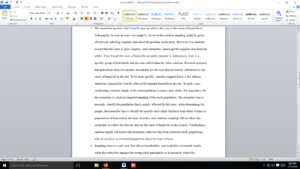Random sampling procedures
Please think of a research question that you would like to study that you could study using random sampling. What is your question, and how would you go about sampling randomly for this type of study?
- Please think of a research question that might lend itself well to using random sampling procedures, but which might be difficult to study using random sampling procedures. What question did you come up with and what sampling would you choose that closely mimics random sampling procedures?
- What do you make of the concept of sampling error? Does this idea make intuitive sense to you? Why or why not? What do you think would happen to a sample if sampling error was not included?
Chapter 5
- What do you think of the UCR? Do you like how it measures crime, why or why not? Do you think the improvements to the UCR made in the creation of NIBRS have helped? Why or why not?
- What do you think of NIBRS? Based on what you have read in the text, why do you think it is has not been widely adapted across the country? Do you think it will eventually replace the UCR or only act as a supplement to it?
- Do you think there are certain types of crime that lend themselves better to one type of measurement than another? If so, give examples of which types of crimes are best measured by the UCR, NCVS, and NIBRS.
Critical Thinking Questions
A4
Chapters 6 and 7
Chapter 6
- In the perfect world of research what type of survey administration method do you think is the best? Please explain your answer and cite information from the text as to why your method of choice is the best.
- What do you see as some of the more salient (important) factors that might affect response rate? As a researcher besides from what has been discussed in the text, what do you think you can do to positively affect response rates? Can you do anything?
- What do you think of questionnaire design? Do you really think that it is important? Why or why not? Please explain your answer in detail.
Chapter 7
- What do you see as some of the inherent advantages of performing research with secondary sets of data? What are some of the weaknesses? Please think critically on this issue.
- Which type of data technique with secondary data interests you more? Content analysis or Meta-analysis? Why?
- What do you make of the argument between official data and self-report data? Which type of data do you see as being more valuable as a secondary data source? Why?
Answer preview
- To be more specific, statistics suggest that it is the African American communities heavily affected by rampant homicide in the city. In such a case, conducting a random sample of the stud population becomes quite tricky. It is imperative for the researcher to conducts targeted sampling of the study population. The researcher has to precisely identify the population that is mainly affected by this issue. After determining the people, the researcher has to identify the specific individuals that have been either victims or perpetrators of homicide in the state. In such a case, random sampling will not allow the researcher to collect the relevant data on the cause of homicide in the country. Conducting a random sample will lead to the researcher collected data from irrelevant study populations who do not have an informed perspective about the issue at hand.
[1405 Words]
Random sampling procedures


